In the 1970s, anthologies of Korean poetry vaulted onto personal reading lists. Two titans — Changbi Publishers and Moonji Publishing Co. — took the reins in advancing the trend, introducing series titled Changbi Poetry Selections and MOONJI Poet Selections. Half a century later, their anthologies remain a fixture on the literary scene.
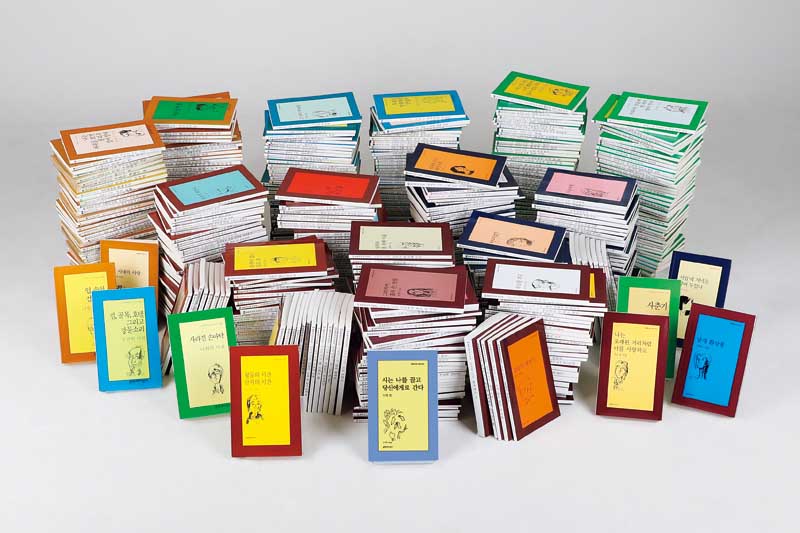
Launched in 1978, MOONJI Poet Selections has published over 620 titles to date. Caricatures of the poets grace the covers of the anthologies.
Courtesy of Moonji Publishing Co., Ltd.
There are very few countries where poetry collections enjoy such great readership as they do in Korea. Koreans’ love of poetry is not limited to famous poems with long-standing popularity or those featured in textbooks. They also devour new works by contemporary poets and may have dozens of volumes on their shelves. Almost every year, new poetry collections enter the bestseller list, and readings by poets often attract overflowing audiences at bookstores. In response to this enthusiasm, publishing companies introduce a steady stream of anthologies. In 2024 alone, 13,611 collections were released in Korea.
To see evidence of this magnetic pull of poetry, one only needs to visit Gwanghwamun Square in the heart of Seoul, where Kyobo Book Centre, the nation’s largest bookstore, offers a lode of poetry. Besides Changbi and Moonji, it offers works by many other publishers, including Geodneunsaram, Munhakdongne Publishing Group, Minumsa, Achimdal Books, and Poem Sijak. Like record labels, each releases poetry series comprising hundreds of anthologies, produced in the same format and design. At one point, more than a hundred publishers were releasing such collections.
To describe the impact, one may turn to German literary critic Walter Benjamin, who likened the formation of ideas to constellations in the night sky. Just as many stars come together to form a constellation, the poetic ideals of each Korean publisher coalesce in the numerous volumes gathered in a series. Each book is like a well-crafted jar, and together they form a magnificent jangdokdae — an outdoor platform for earthenware jars storing sauces and condiments — of poetry. In the courtyard of language, these jars of poetry instill the Korean language with an eternal quality.
POPULARIZATION OF POETRY
Anthology of Modern Poets, published in 1970, was the first of its kind in Korea. Compiled by the Society of Korean Poets, it largely featured works by lyric poets, such as Kim Kwang-lim, Park Nam-su, Park Jaesam, Shin Seok-jeong, Lee Hyeonggi, and Cho Byung-hwa, but was short-lived. It was Minumsa’s World Poet Selections and Today’s Poet Series, launched in 1973 and 1974, respectively, that sowed the seeds for devoted poetry readership. The anthologies even became collector’s items.
Beginning with the Korean translation of Anthology of Tang Poetry by the poet Ko Un, ten to fifteen titles were published annually in the World Poet Selections series. They consisted of carefully curated selections featuring works by the likes of Goethe, Baudelaire, Rimbaud, Wordsworth, Byron, Pushkin, Whitman, Eliot, and Tagore, with the original text presented alongside the Korean translation. By 1978, eighty volumes had been published. The publication still exists, having undergone changes in design, format, and composition in the 1990s and 2010s, making it Korea’s oldest surviving poetry series.
Today’s Poet Series began with The Great Root, a posthumous collection of works by Kim Su-yeong, whose name is synonymous with freedom and resistance. Showcasing poems noted for their modernity, innovation, and experimental spirit, the series created a stir in the Korean poetry scene. In addition to Kim Su-yeong, it featured poets such as Kim Chun-su, Ko Un, Kim Jong-sam, Hwang Tong-gyu, Oh Kyu Won, Jeong Ho-seung, Choi Seung-Ho, and Ji-woo Hwang. Collectively, they have left an indelible mark on modern Korean poetry.
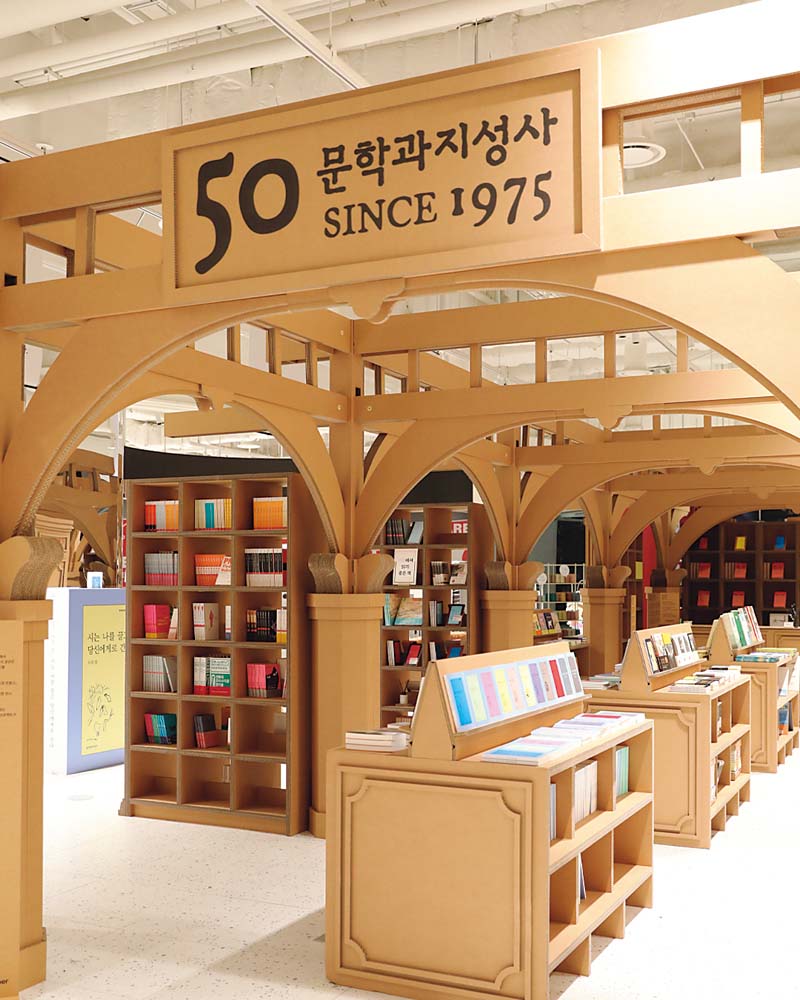
In July 2025, Moonji opened a pop-up store at I’PARK Mall in Yongsan, Seoul. New releases, including poetry collections, are displayed in booths made from cardboard. Pop-up stores are increasingly becoming a favorite marketing tool among publishing companies.Courtesy of Moonji Publishing Co., Ltd.
Following the success of these two series, poetry’s share in literary publishing grew, fueling its mainstream popularity. The launch of Changbi Poetry Series and MOONJI Poet Selections in the 1970s added further momentum. For half a century since their inception, each series has been adding new titles every year, making them a prominent force in modern Korean poetry.
MOONJI Poet Selections was launched in 1978 with Hwang Tong-gyu’s anthology When I See a Wheel, and its 621st edition was published this July. It is the largest poetry collection series in Korea, unparalleled even in the global literary world. Changbi Poetry Series is a close second in scale. Since its inception in 1975 with Shin Kyong-nim’s anthology Farmers’ Dance, 521 titles have been published to date. Until the early 2000s, the two series followed distinctly contrasting poetic inclinations, which shaped a more dynamic and diverse poetry scene.
SOCIAL ENGAGEMENT
Changbi Poetry Series has largely introduced works expressing a critical consciousness and will to transform reality while also adhering to populist lyricism. A prime example is Shin Kyung-nim’s poem “Farmers’ Dance” (Nongmu), which vividly portrays the harsh realities and travails of Korean farmers, as well as their frustrations and sorrows. This work marked a shift in the language of Korean poetry, which had emphasized the transcendent, toward concrete realism and populist vitality.
In the early years, the series featured poets who embraced literature’s social engagement, employing simple yet emotionally resonant language to promote the spirit of resistance against the dictatorial regime and belief in democracy while depicting the people’s suffering and their will to fight. Notable collections from this early period include Early Morning Road (Ko Un), With a Burning Thirst (Kim Ji-ha), Rinsing the Shovel in the Twilight River (Jung Hee-Sung), Where Thoughts Reside (Kim Nam-ju), Sumjin River (Kim Yong-taek), True Beginning (Park Nohae), and Ritual for the Dead (Chohonje; Ko Jung-hee).
After the 1990s, Changbi Poetry Series gradually shifted in response to the collapse of ideologies and the rise of globalization and neoliberalism. The scope of populist lyricism was extended to include urban life and champion issues such as ecologism and feminism. Some of the series’ prominent titles from this period are Liking in Silence (Kim Sa-in), If My Tongue Refuses to Remain in My Mouth (Kim Sun-woo), What is Darkening (Ra Heeduk), Bare Foot (Moon Taejun), Beloved Fox (Ahn Do-hyun), Love, Then Die (Jeong Ho-seung), At Thirty, the Party Was Over (Choi Young-mi), and Flowers Bloom at Every Boundary (Ham Min-bok).
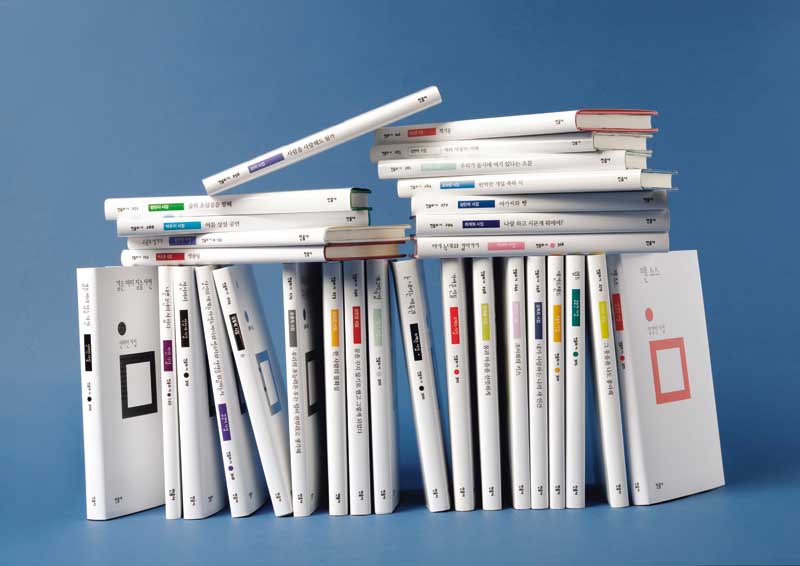
Poems of Minum, Minumsa’s principal poetry collection series, was launched some forty years ago. It has a distinctive approach, highlighting idiosyncratic, experimental works, which sets it apart from other poetry anthologies.
Courtesy of Minumsa
EXISTENTIAL CONTEMPLATION
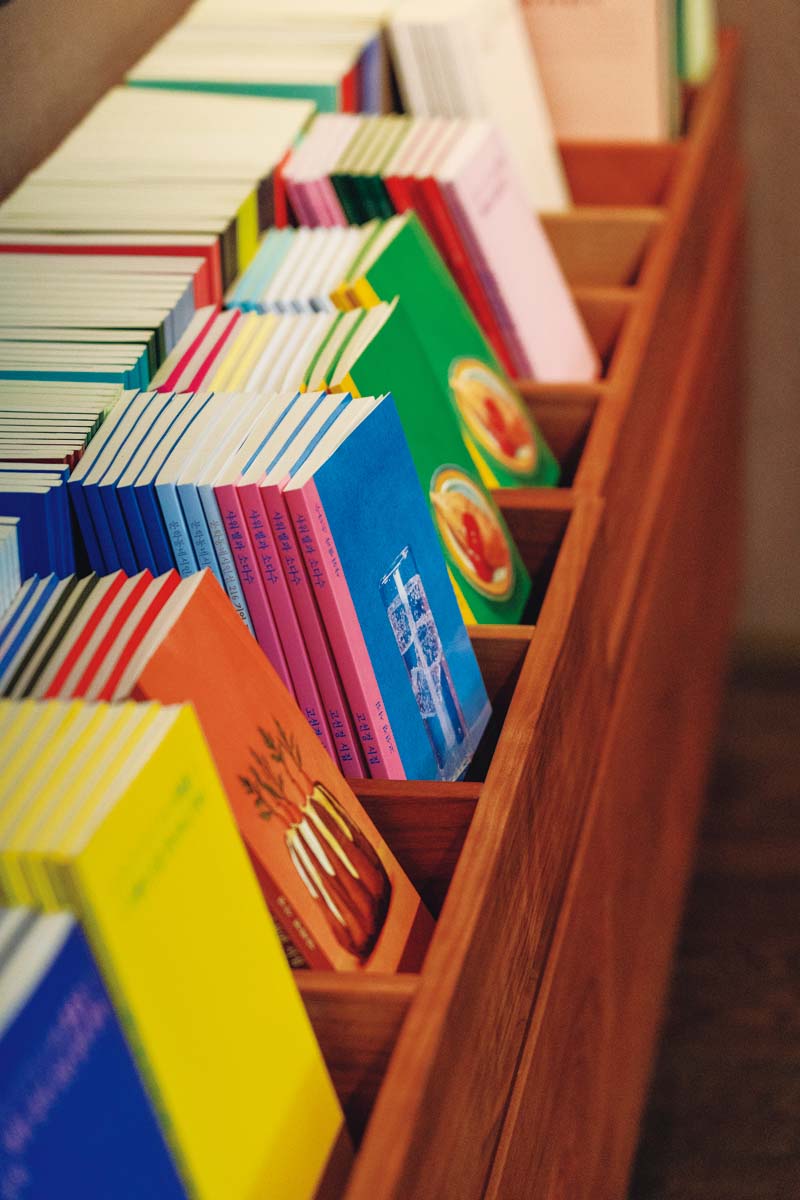
Munhakdongne Poet Selections, launched later than other anthologies by major publishers, made a strong impression with its bold, simple design. In 2024, Munhakdongne opened a pop-up store in collaboration with stationery concept shop Point of View in Seongsu-dong, Seoul, where three special re-covered poetry collections were unveiled.
Courtesy of Point of View
Changbi Poetry Series highlighted minjung (people’s) poetry that narrates the plight of everyday people and their fight for democracy. Adopting a far different approach, MOONJI Poet Selections featured works with an avant-garde spirit. Its focus was introspection, existential contemplation, and linguistic exploration. It did not ask, “How can poetry change society?” but rather, “What is poetry, and what can be done with language?”
Poets featured in the Moonji series’ early years reflected on issues such as political and social violence, and the oppression of tradition and convention through linguistic innovation — dismantling grammatical structures and destroying form — while also weaving the sensory experiences associated with industrialization and urbanization into their poems. Major titles from this period include When Will the Rolling Stone Awaken? (Yi Seong-bok), Love of This Age (Choi Seung-ja), Even Birds Leave the World (Ji-woo Hwang), Poor Love Machine (Kim Hyesoon), The Birds Set the Sky Free (Hwang In-suk), and Black Leaf in My Mouth (Ki Hyongdo).
Even after the 2000s, the series continued in the same spirit, pioneering linguistic innovation and avant-garde styles in Korean poetry. Prominent collections from this time include A Mathematician’s Morning (Kim So Yeon), The Goodbye Ability (Kim Haengsook), Biologicity (Shin Hae-uk), Fifteen Seconds Without Sorrow (Shim Bo-Seon), The World’s Lightest Motorcycle (Yi Won), A Dictionary of Seven Words (Jin Eun-young), Alone to a Distant House (Heo Su-kyung), and Body Show and Complete Works (Hwang Byungsng).
EEW LANGUAGE OF LYRICISM
Since the 2010s, mutual engagement among poets has intensified and the number of poets moving between the two series has grown. With the widely accepted belief that linguistic innovation leads to sensory innovation, then innovation in perception, and ultimately innovation in the real world, both series emphasize free, creative imagination. They present poetic worlds that combine sensory experimentation with language and a new lyricism. Popular poets featured in Changbi Poetry Series include Ahn Mi-ok, Ahn Hee-yeon, and Choi Ji Eun, while Seo Yoon-hu, Yoo Heekyung, Lim Solah, and Lee Jenny are among the favorites in MOONJI Poet Selections.
Aside from these two major publications, a myriad of other poetry series can be found on Korean bookstore shelves. Poems of Minum, launched by Minumsa in 1987, has released 334 titles to date. It highlights idiosyncratic, experimental works by poets such as Kim Yeong-seung, Moon Bo Young, Sung Mi-jeong, Sung Dong-hyeok, Ahn Mi-rin, Yang An-da, Oh Eun, Jang Jung-il, Choi Seung-Ho, and Hwang Inchan.
Munhakdongne, a key player in Korean literary publishing alongside Moonji, Minumsa, and Changbi, also jumped into poetry publication in 2011 by launching Munhakdongne Poet Selections. With 238 titles to date, the series is characterized by its persistent effort to capture the daily lives and sensibilities of Koreans in a fresh lyrical language. Kim Kyung-ju, Kim Hyun, Kim Min-jeong, Park Joon, Shin Cheol-gyu, and Lee Won-ha are some of the notable poets in the series. Sijak Poet Selections (539 volumes, published by Poem Sijak), Geodneunsaram Poet Selections (126 volumes, published by Geodneunsaram), and Achimdal Poetry Collection (51 volumes, published by Achimdal), are other important constellations in the vast universe of Korean poetry.

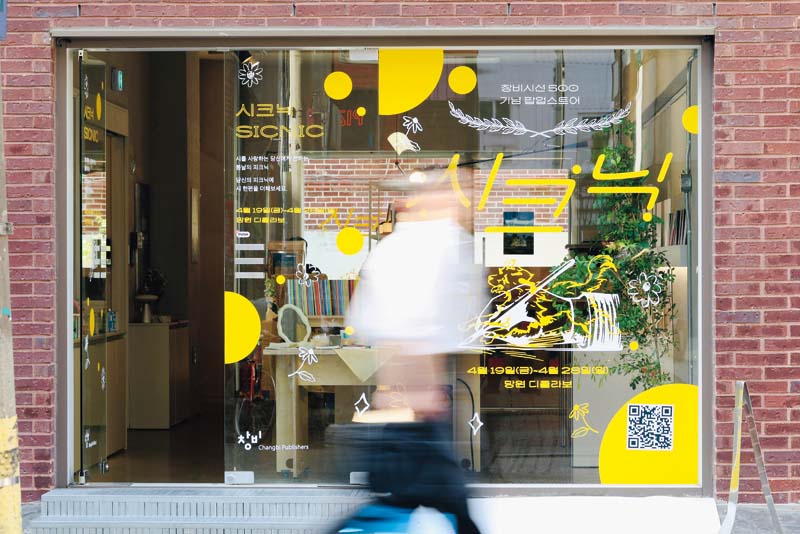
In April 2024, Changbi Publishers opened a pop-up store in Mangwon-dong, Seoul, to commemorate the 500th edition of Changbi Poetry Selections. Featuring fragrance and music recommendations that complemented the poems as well as limited-edition goods, it presented readers with an immersive experience allowing them to engage with poetry through all five senses.
Courtesy of Changbi Publishers
Jang Eun-suPublishing Critic